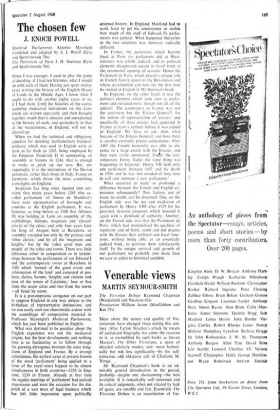The chosen few
J. ENOCH POWELL
Medieval Parliaments Antonio Marongiu translated and adapted by S. J. Woolf (Eyre and Spottiswoode 70s) The Parlement of Paris J. H. Shennan (Eyre and Spottiswoode 70s) When I was younger, I used to play the game of deciding, if I had ten lifetimes, what I would do with each of them. Having just spent twenty years writing the history of the English House of Lords in the Middle Ages, I know what I ought to do with another eighty years or so, if I had them. Until the histories of the corre- sponding mediaeval institutions on the Con- tinent are written separately and then brought together, much that is obscure and unexplained in the history of each, and particularly in that of the westernmost, in England, will not be cleared up.
When we find the technical and obligatory adjective for denoting 'parliamentary business' (arduus), which was used in English writs at least as far back as 1205, being employed by the Emperor Frederick II in summoning an assembly at Verona in 1244, that is enough to make us prick up our ears. But, un- expectedly, it is the institutions of the Iberian peninsula, rather than those of Italy, France or Germany, which throw the most astonishing cross-lights on England.
Suspicion has long since ripened into cer- tainty that many years before 1265 (the so- called parliament 'of Simon de Montfort') there were representatives of boroughs and counties at the English parliament. It was, however, as long before as 1188 that Alfonso IX was holding at Leon an assembly of the archbishops, bishops, magnates and 'chosen' (electi) of the cities; and only four years later the king of Aragon held at Barcelona an assembly attended not only by the prelates and `other clerics,' and by all the 'magnates and knights,' but by the 'other good men and people' of the cities and towns. There was little difference either in composition or in termin- ology between the parliaments of our Edward I and the contemporary cortes at Barcelona in 1283 which 'treated of the good estate and reformation of the land' and consisted of pre- lates, clerics, barons, 'knights and citizens and men of the towns of Catalonia,' four or five from the major cities and two from the towns —all listed by name.
It is a presumptuous arrogance on our part to suppose England in any way unique as the birthplace of representative institutions; and we can easily cool our chauvinistic ardour with the assemblage of comparative material in Professor Marongiu's Medieval Parliaments, which has just been published in English.
What was destined to be peculiar about the English experience was not the mediaeval origins, but the later development; and nothing here is so fascinating as to follow through the growing divergence between the sister king- doms of England and France. By a strange coincidence, the earliest cases at present known of the word 'parliament' being applied to a form of the royal court happen to be almost simultaneous in both countries-1236 in Eng- land, 1239 in France. Already at that time the regular meetings of 'parliament' had judicial importance and were the occasion for the dis- patch of a vast mass of legal business which has left little, impression upon politically oriented history. In England, Maitland had to work hard to get his countrymen to realise how much of the stuff of Edward I's parlia- ments was judicial. What happened thereafter in the -two countries was, however, radically different.
In France, the parlement, which became fixed at Paris (as parliament did at West- minster), was wholly judicial, and its political elements disappeared except in fossil form at the ceremonial opening of sessions. Hence the Parlement de Paris, which played a unique role in French history down to the Revolution and whose development can now for the first time be studied in English in Mr Shennan's book.
In England, on the other hand, it was the political elements which took root as parlia- ment and extruded most, though not all, of the judicial. The counterpart in France was not the parlenrent but the 'Estates General'; for the notion of representation of 'estates,' and specifically of three estates, had appeared in France at least a century before it was copied in England. We have to ask, then, what became of the Estates General; and here there is another curiously precise coincidence. After 1485 the French monarchy was able to dis- pense to a large extent with the Estates, and they were rarely summoned. Under the con- temporary Henry Tudor the same thing was happening in England : Henry VII held only one parliament between 1497 and his death in 1509, and he was 'not minded of long time to call and summon a new parliament.'
What occurred to make so profound a difference between the French and English ex- perience subsequently? Two factors, cut of many no doubt, can be discerned. One, on the English side, was the use and exaltation of parliament by Henry VIII after 1529 for his personal, dynastic purposes, which invested it again with a plenitude of authority. Another, on the French side, was that the Parlement de Paris, which had monopolised the qualities of regularity and of fixity, could and did dispute with the Estates their political and fiscal func- tions, without being able, as an essentially judicial body, to perform them satisfactorily itself. In the unique survival and growth of our parliament we probably owe more than we care to admit to historical accident.






































 Previous page
Previous page